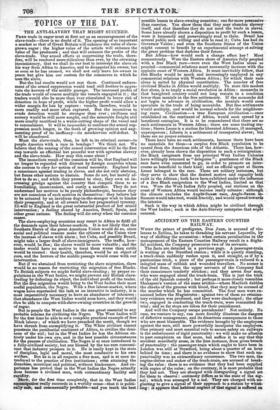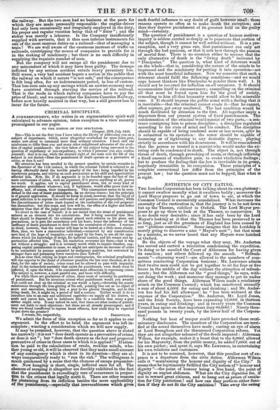ACCIDENT ON THE EASTERN COUNTIES RAILWAY.
WHEN the prince of profligates, Don Juan, is accused of vio- lences to Zerlina, he takes to thrashing his servant Leporello, by way of shifting the accusation : when certain peculiarities in the management of the Eastern Counties Railway result in a fright- ful accident, the Company prosecutes two of its servants.
The facts are detailed in a previous page. A passenger-train is waiting at the Stratford station ; while it is quietly standing, a truck-train suddenly rushes upon it, and straight, as if by a pantomime trick, a piece of the passenger-train is reduced to s mingled mass of rubbish and wounded travellers. No sooner is that deed done, than the upper servants of the Company find. their consciences tenderly stricken - and they arrest four men, who were engaged about the truck-train. This is just the trick of the old Spanish comedy ; but perhaps it more closely resembles Shakapere's version of the same artifice—where Macbeth dabbles the cheeks of the grooms with blood, that they may be accused of the murder which he has committed. The four men were ex- amined before the Magistrates : against two of them no c-rimina- tory evidence was produced, and they were discharged ; the other two, engaged in conducting the truck-train, were committed for trial ; and so far steps are taken for their punishment. And will the Company escape punishment ? Not entirely. No case, we venture to say, can more forcibly illustrate the dangers of defective management, and its disastrous consequences to those who are most blameable. The evidence brought by the employers against the men, still more powerfully inculpates the employers. One primary and most essential rule to secure safety on railways is the enforcement of rigid punctuality : we will make no allusion to past complaints on that score' but suffice it to say that this accident manifestly arose, in the first instance, from gross breach of punctuality : the passenger-train which ought to have been in London was still at Stratford, bein$ about a quarter of an hour behind its time ; and there is no evidence to show that such un- punctuality was an extraordinary occurrence. The two men, the engine-driver and stoker of the truck-train, are accused of break- ing the rules : there is no evidence that they had been supplied with copies of the rules ; on the contrary, it is most probable that they had not. They are charged with disregarding a signal set for them to observe : ‘estimony differs as to the state of the sig- nal; which was arranged by a lad. They are charged with ne- . glecting to give a signal of their approach to a station by whist- ling : it appears that habitual neglect of that signal is suffered on
the railway. But the two men had no business at the posts for which they are made personally responsible : the engine-driver had only been occasionally and irregularly employed in the duty, his proper and regular vocation being that of " fitter " ; and the stoker was merely a labourer. Is the Company insufficiently supplied with servants, that it thus uses inferior instruments for one of the most onerous duties on a railroad—that of managing a train? We are well aware of the enormous increase of traffic on railroads, outstripping the means of companies to provide for it in the making of machinery ; but there is no such difficulty in supplying the requisite number of men. But the company will not escape all the punishment due to any misconduct of which it may have been guilty. The damage inflicted by any serious accident entails heavy pecuniary loss. Still worse, a very bad accident begets a notion in the public that the railway on which it occurs "is not safe," and the consequence is felt long after, for an indeterminate period, in loss of custom. That loss soon eats up any savings which an unwise economy may have contrived through starving the service of the railroad. That is the mode in which railway companies have to pay the price of blood; and we suspect that the Eastern Counties Railway, before now heavily mulcted in that way, has a still greater loss to incur for the future.



























 Previous page
Previous page